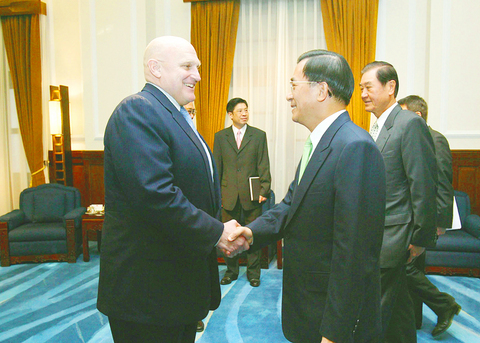A senior US official has refused to say whether President Chen Shui-bian (
Assistant Secretary of State for East Asia Christopher Hill, when asked by reporters after an appearance before a congressional committee hearing, would not say whether Taiwan had responded to a State Department demand last Thursday for assurances that Chen's actions were not intended to change the cross-strait "status quo."
Demands

PHOTO: CNA
The department's demands were contained in a hastily issued statement in which it both expressed its conviction that Chen did not intend to change the status quo, and also asked him once again to assure Washington that that was his real intent.
The latter request followed what turned out to be erroneous reports that DPP officials said Chen had abolished the council and guidelines, rather than just mothballing them.
State Department spokesmen have mentioned Chen's actions and the cross-strait dialogue issue several times in the same breath over the past two weeks, but this was the clearest indication yet that the Washington feels that direct dialogue is the only answer to the actions by both sides that have rattled cross-strait relations in recent years.
"I don't want to characterize our view on assurances [from Chen]," Hill told reporters.
"What I want to emphasize is that we believe this is an issue that needs to be resolved through dialogue, and that both sides need to show restraint," he said.
In a reference to the so-called "Anti-Secession" Law that Beijing's National People's Congress approved last March, Hill said that "there is no role for any mention of non-peaceful means," the phrase the law used as a threat to invade Taiwan if it moves toward formal independence.
Hill called on both sides to "approach this not unilaterally but in a mutual effort at dialogue," adding "There is no room here for unilateral announcements or any threats of the use of force of any kind."
In his written testimony before the subcommittee, Hill called on Beijing to "engage in meaningful dialogue with Taiwan's democratically elected leaders in the near future."
It was not clear what he meant by the "near future," or whether he has any information that Beijing is willing to engage in talks any time soon.
Nor was there any indication that the administration of US President George W. Bush has been making any special effort to press Beijing into opening talks with Chen.
Hill told a reporter that he had "no new information" about whether China was willing to open talks with Chen's government, at least on the basis demanded by Taiwan and Washington, that is, without any conditions that they be based on the so-called "one China" principle.
Confidence
Meanwhile, Taiwan's de-facto ambassador to the US, David Lee (
He said he was "very surprised" by the State Department's statement last Thursday calling on Chen to explain his actions and assure Washington he does not intend to change the status quo.
While saying that differences remain between Washington and Taipei on the issue, Lee added that "in the past few days we have been trying to bridge the differences. I'm confident that we will sort out the issue in the near future," certainly well before Chinese President Hu Jintao (
"I don't think we have a deep gap between us," Lee told the Taipei Times. "I think both sides need to be more considerate with each other."

An essay competition jointly organized by a local writing society and a publisher affiliated with the Chinese Communist Party (CCP) might have contravened the Act Governing Relations Between the People of the Taiwan Area and the Mainland Area (臺灣地區與大陸地區人民關係條例), the Mainland Affairs Council (MAC) said on Thursday. “In this case, the partner organization is clearly an agency under the CCP’s Fujian Provincial Committee,” MAC Deputy Minister and spokesperson Liang Wen-chieh (梁文傑) said at a news briefing in Taipei. “It also involves bringing Taiwanese students to China with all-expenses-paid arrangements to attend award ceremonies and camps,” Liang said. Those two “characteristics” are typically sufficient

A magnitude 5.9 earthquake that struck about 33km off the coast of Hualien City was the "main shock" in a series of quakes in the area, with aftershocks expected over the next three days, the Central Weather Administration (CWA) said yesterday. Prior to the magnitude 5.9 quake shaking most of Taiwan at 6:53pm yesterday, six other earthquakes stronger than a magnitude of 4, starting with a magnitude 5.5 quake at 6:09pm, occurred in the area. CWA Seismological Center Director Wu Chien-fu (吳健富) confirmed that the quakes were all part of the same series and that the magnitude 5.5 temblor was

The brilliant blue waters, thick foliage and bucolic atmosphere on this seemingly idyllic archipelago deep in the Pacific Ocean belie the key role it now plays in a titanic geopolitical struggle. Palau is again on the front line as China, and the US and its allies prepare their forces in an intensifying contest for control over the Asia-Pacific region. The democratic nation of just 17,000 people hosts US-controlled airstrips and soon-to-be-completed radar installations that the US military describes as “critical” to monitoring vast swathes of water and airspace. It is also a key piece of the second island chain, a string of

The Central Weather Administration has issued a heat alert for southeastern Taiwan, warning of temperatures as high as 36°C today, while alerting some coastal areas of strong winds later in the day. Kaohsiung’s Neimen District (內門) and Pingtung County’s Neipu Township (內埔) are under an orange heat alert, which warns of temperatures as high as 36°C for three consecutive days, the CWA said, citing southwest winds. The heat would also extend to Tainan’s Nansi (楠西) and Yujing (玉井) districts, as well as Pingtung’s Gaoshu (高樹), Yanpu (鹽埔) and Majia (瑪家) townships, it said, forecasting highs of up to 36°C in those areas